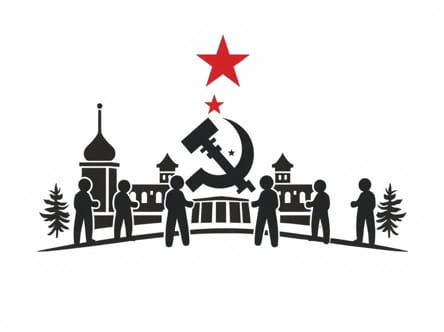The Bolshevik Revolution, also known as the Russian October Revolution of 1917, was one of the most transformative political events in the 20th century. It marked the downfall of the Russian Provisional Government and the rise of the Bolsheviks, a radical socialist group led by Vladimir Lenin. This revolutionary movement not only reshaped Russian society but also laid the foundation for the creation of the Soviet Union, influencing global politics for decades. The causes, key events, and long-term effects of the Bolshevik Revolution continue to be a subject of deep interest for historians, scholars, and political analysts worldwide.
Background to the Bolshevik Revolution
The Russian Empire Before 1917
Before the Bolshevik Revolution, Russia was a vast and diverse empire ruled by the Romanov dynasty. Tsar Nicholas II held absolute power, but his inability to manage the country’s affairs led to growing discontent among the population. Economic hardship, military failures during World War I, and widespread inequality created fertile ground for revolutionary ideas to take hold.
The Rise of Revolutionary Thought
By the early 20th century, Russia had become a breeding ground for revolutionary movements. Marxist ideology, advocating for a classless society and the overthrow of capitalism, gained traction among workers and intellectuals. The Bolsheviks, a faction of the Russian Social Democratic Labour Party, believed that only a tightly organized party could lead a successful socialist revolution.
The February Revolution and the Provisional Government
Overthrow of the Tsar
In February 1917, massive protests and strikes in Petrograd (now St. Petersburg) forced Tsar Nicholas II to abdicate. This event marked the end of centuries of imperial rule. A Provisional Government was established, primarily composed of liberal and moderate socialist leaders. However, it failed to withdraw Russia from World War I or address the demands of workers and peasants.
The Dual Power Structure
At the same time, soviets (workers’ councils) began to emerge, representing the interests of the working class. The Petrograd Soviet, in particular, held considerable influence. This dual power structure between the Provisional Government and the soviets created instability and confusion, which the Bolsheviks were quick to exploit.
The Role of Lenin and the Bolsheviks
Lenin’s Return and April Theses
In April 1917, Vladimir Lenin returned from exile with the help of the Germans, who hoped he would weaken Russia’s war effort. Upon arrival, Lenin published the ‘April Theses,’ which called for an immediate end to the war, the transfer of power to the soviets, and the redistribution of land. These radical ideas gained popularity among workers, peasants, and soldiers.
Gaining Support
The Bolsheviks skillfully used slogans such as Peace, Land, and Bread to rally support from the masses. They criticized the Provisional Government’s failure to address economic problems and capitalized on the people’s growing dissatisfaction. Through agitation, propaganda, and organizing within soviets, the Bolsheviks steadily expanded their influence.
The October Revolution
Planning the Uprising
By October 1917, the Bolsheviks had gained a majority in the Petrograd Soviet. Lenin and his allies believed the time was ripe for a coup. Leon Trotsky, a key Bolshevik leader, played a critical role in organizing the Red Guards and planning the insurrection. The operation was strategically timed to coincide with the All-Russian Congress of Soviets, giving it a semblance of legitimacy.
Seizing Power
On the night of October 25, 1917 (Julian calendar), Bolshevik forces stormed key government buildings in Petrograd, including the Winter Palace. The Provisional Government offered little resistance, and within a day, the Bolsheviks declared themselves in control. Lenin announced the formation of a new government: the Council of People’s Commissars.
Impact and Consequences
Establishment of a Communist State
The Bolsheviks moved quickly to consolidate power. They nationalized land, banks, and industry, and withdrew Russia from World War I through the Treaty of Brest-Litovsk. Opposition was suppressed, and political parties that challenged Bolshevik rule were banned. These actions marked the beginning of a one-party communist state.
Civil War and Red Terror
Not all segments of Russian society accepted Bolshevik rule. A brutal civil war broke out between the Red Army (Bolsheviks) and the White Army (a coalition of monarchists, liberals, and foreign powers). The Bolsheviks implemented the Red Terror, a campaign of political repression that involved executions and imprisonment of perceived enemies. The civil war lasted until 1922 and resulted in millions of deaths.
Formation of the Soviet Union
In 1922, following their victory in the civil war, the Bolsheviks reorganized the Russian territories into the Union of Soviet Socialist Republics (USSR). The Soviet Union became the world’s first communist state and remained a major global power until its dissolution in 1991. The ideology and structure implemented by Lenin and his successors influenced communist movements around the world.
Legacy of the Bolshevik Revolution
Global Influence
The Bolshevik Revolution inspired revolutions and socialist movements in various parts of the world, including China, Cuba, and Vietnam. It challenged the capitalist order and became a central point of conflict during the Cold War. The ideological battle between communism and capitalism shaped international relations for most of the 20th century.
Controversial Historical Interpretations
Historians remain divided over the legacy of the Bolshevik Revolution. Some see it as a noble attempt to create a more just and equal society, while others view it as the beginning of an oppressive regime that led to widespread human suffering. What is clear is that the revolution changed the course of history and had profound effects both within and beyond Russia’s borders.
The Rus ki Bolshevik Kranti was a defining moment in modern history. From its roots in the suffering and inequality of Tsarist Russia to the dramatic rise of Lenin and the Bolsheviks, it fundamentally altered the political and social fabric of the nation. The consequences of the revolution civil war, the establishment of the Soviet Union, and global ideological conflict continue to echo through history. Understanding the causes and impact of the Bolshevik Revolution provides crucial insight into the complexities of revolution, power, and the pursuit of ideological change.
